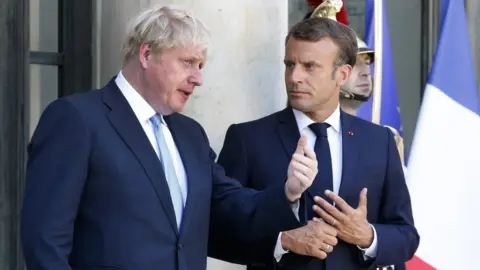Brexit: Donald Tusk and Boris Johnson clash over who is 'Mr No Deal'
European Council President Donald Tusk and Prime Minister Boris Johnson have clashed over who would be to blame in the case of a no-deal Brexit.
Mr Tusk said Mr Johnson risked being remembered as "Mr No Deal" - but the PM responded by saying it was Mr Tusk who would become "Mr No-Deal Brexit".
The pair are due to meet for talks at the G7 summit in France on Sunday.
Mr Tusk added the EU was "willing to listen" to the PM's ideas for Brexit - as long as they are "realistic".
But speaking at his press conference in Biarritz, Mr Tusk said he would "not co-operate on [a] no-deal".
Since becoming PM, Mr Johnson has said the UK will leave the EU on 31 October.
Mr Johnson has repeatedly stated he would prefer to leave the EU with a deal, but insists the backstop - the insurance policy designed to avoid a hard border on the island of Ireland - must be removed from the withdrawal agreement.
"I've made it absolutely clear I don't want no deal and that we've got to get rid of the backstop from the treaty and if Mr Tusk doesn't want to go down as Mr No-Deal Brexit I hope that point will be borne in mind too," he said.
Earlier in the day, Mr Tusk had used the same moniker when talking about Mr Johnson.
"I still hope Prime Minister Johnson will not like to go down in history as Mr No Deal," he said.
"The EU has always been open to co-operation. One thing I will not co-operate on is a no deal.
"We are willing to listen to ideas that are operational, realistic and acceptable to all EU member states."

'All signs point to a no-deal Brexit'
Analysis by BBC diplomatic correspondent James Landale
When Boris Johnson met President Emmanuel Macron and Chancellor Angela Merkel this week, he got a relatively positive response.
Both leaders indicated they were willing to listen to any ideas the prime minister may have to avoid a no-deal Brexit.
But Mr Johnson's meeting with Donald Tusk at the G7 summit on Sunday may now prove more problematic.
The spat between both men - both of them warning they could go down in history as Mr No Deal - shows that both sides are engaged in a blame game.
Neither side wishes to be seen as the intransigent partner in a negotiation that leads to no deal.
Mr Macron and Ms Merkel were implicit in this, while Mr Tusk was explicit, prompting an equally blunt response from Mr Johnson.
It is, of course, still possible that some political space may be carved out to allow for a compromise at the last minute. But all the signs still point towards a no-deal Brexit at the end of October.

The G7 summit - a get-together of most of the leaders of the world's largest economies - comes with just over two months until the UK is scheduled to leave the EU at the end of October.
Mr Johnson wants to renegotiate the Irish backstop - a key Brexit sticking point - but the EU has consistently ruled this out.
Speaking on Saturday, Mr Johnson said: "We've made it very clear we won't be instituting any kind of checks or controls at the Northern Irish border. We don't think such controls are necessary.
"There are a large range of alternative arrangements - these we will be discussing in the coming weeks."
If implemented, the backstop - a last resort should the UK and the EU not agree a trade deal after Brexit - would see Northern Ireland staying aligned to some rules of the EU single market.
It would also see the UK stay in a single customs territory with the EU, and align with current and future EU rules on competition and state aid.
At a news conference on Wednesday with Mr Johnson, German Chancellor Merkel suggested an alternative to the backstop might be achievable, adding that the onus was on the UK.
 Getty Images
Getty ImagesBut the next day French President Macron said the backstop was "indispensable" to preserving political stability and the single market.
After visiting his counterparts in Paris and Berlin this week, Mr Johnson said there was "new mood music", but reaching a new deal would not be "a cinch".
He has insisted the UK will leave the EU on 31 October, whether or not a new deal is reached.
Mr Johnson will also meet with US President Donald Trump, who arrived in France around Saturday lunchtime.
Asked if he would be telling Mr Trump not to escalate the US-China trade war, Mr Johnson said: "You bet."
He added one of his priorities for the summit was "the state of global trade".
